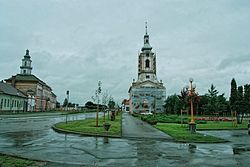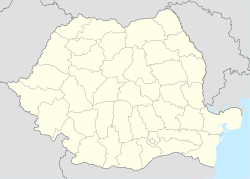Sânnicolau Mare
| Sânnicolau Mare | |
|---|---|

Serbian church
|
|
| Location of Sânnicolau Mare | |
| Coordinates: 46°4′20″N 20°37′46″E / 46.07222°N 20.62944°ECoordinates: 46°4′20″N 20°37′46″E / 46.07222°N 20.62944°E | |
| Country |
|
| County |
|
| Status | Town |
| Government | |
| • Mayor | Dănuț Groza (PNL) |
| Area | |
| • Total | 136.77 km2 (52.81 sq mi) |
| Population (2011) | |
| • Total | 11,540 |
| Time zone | EET (UTC+2) |
| • Summer (DST) | EEST (UTC+3) |
| Climate | Cfb |
| Website | http://www.sannicolau-mare.ro/ |
Sânnicolau Mare (formerly spelled Sînnicolau Mare, Romanian pronunciation: [sɨnnikoˌla.u ˈmare]) is a town in Timiș County, Romania and the westernmost of the country. Located in the Banat region, along the borders with Serbia and Hungary, it has a population of just under 12,000.
In German, it is known as Groß Sankt Nikolaus, in Hungarian as Nagyszentmiklós, in Banat Bulgarian as Smikluš, and in Serbian as Сент Николаш / Sent Nikolaš. It is translated as "Great St. Nicholas" in English.
Near Sânnicolau Mare there are the remains of Morisena, an ancient town, seat of Roman legions and of medieval dukes of Banat. After the Treaty of Passarowitz (1718) until 1918, Sânnicolau Mare (and the Banat) was part of the Austrian monarchy, Temes District; in Transleithania after the compromise of 1867 in Austria-Hungary. In the late 18th century, the Habsburg dynasty of Austria recruited German farmers and artisans to resettle areas along the Danube that had been depopulated during the Ottoman reign and the plague. They were allowed to keep their own religion, language and culture, and many German villages were founded in the Banat. The descendants of the ethnic Germans became known as Danube Swabians (Danauswaben) and spoke a distinct form of German that became different from what evolved in the principal states. This is one reason for the high proportion of ethnic Germans in the town before World War II. After the war, many left the area to escape Soviet dominance; others were expelled because of anti-German sentiment throughout eastern Europe.
...
Wikipedia

